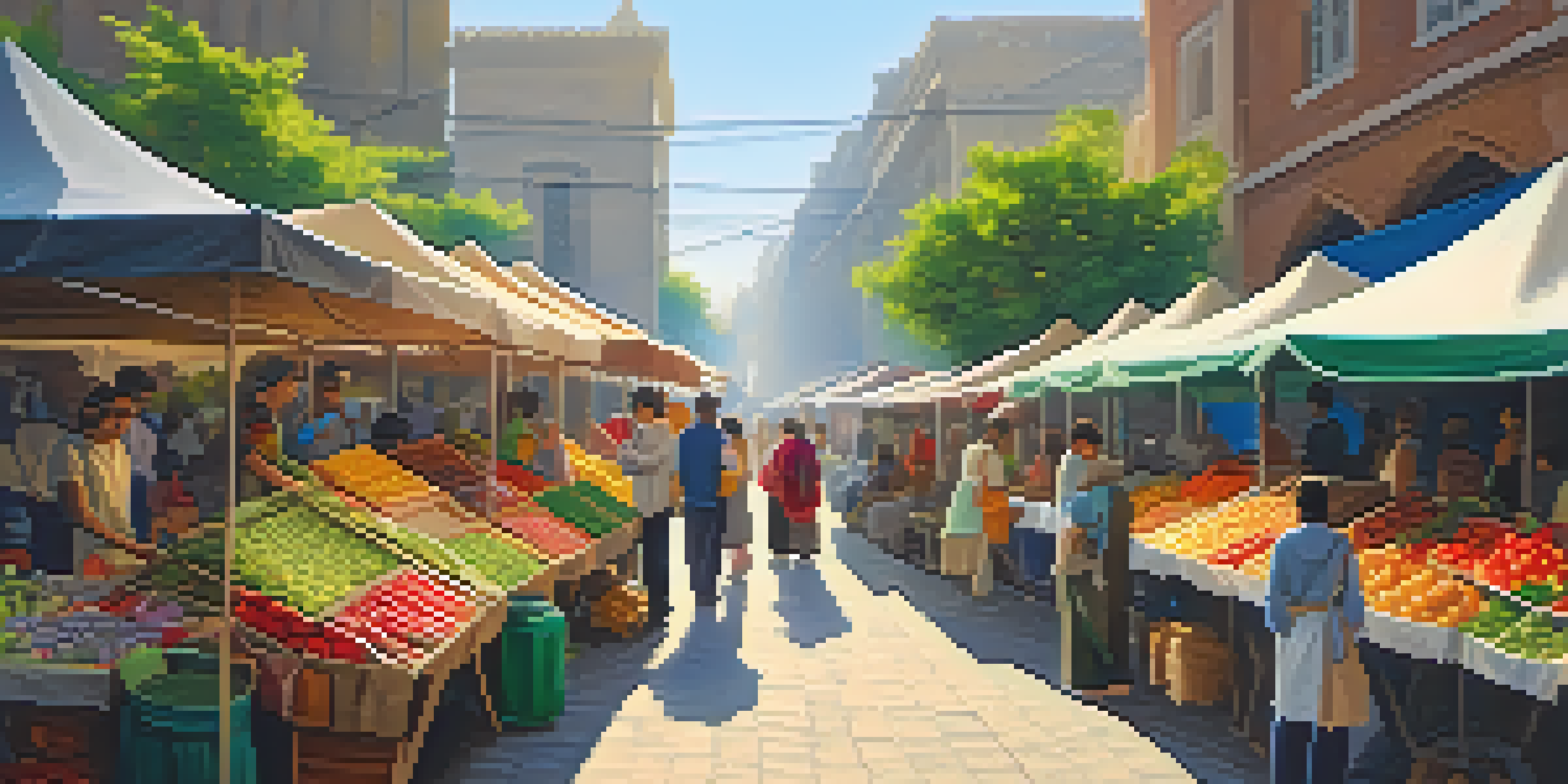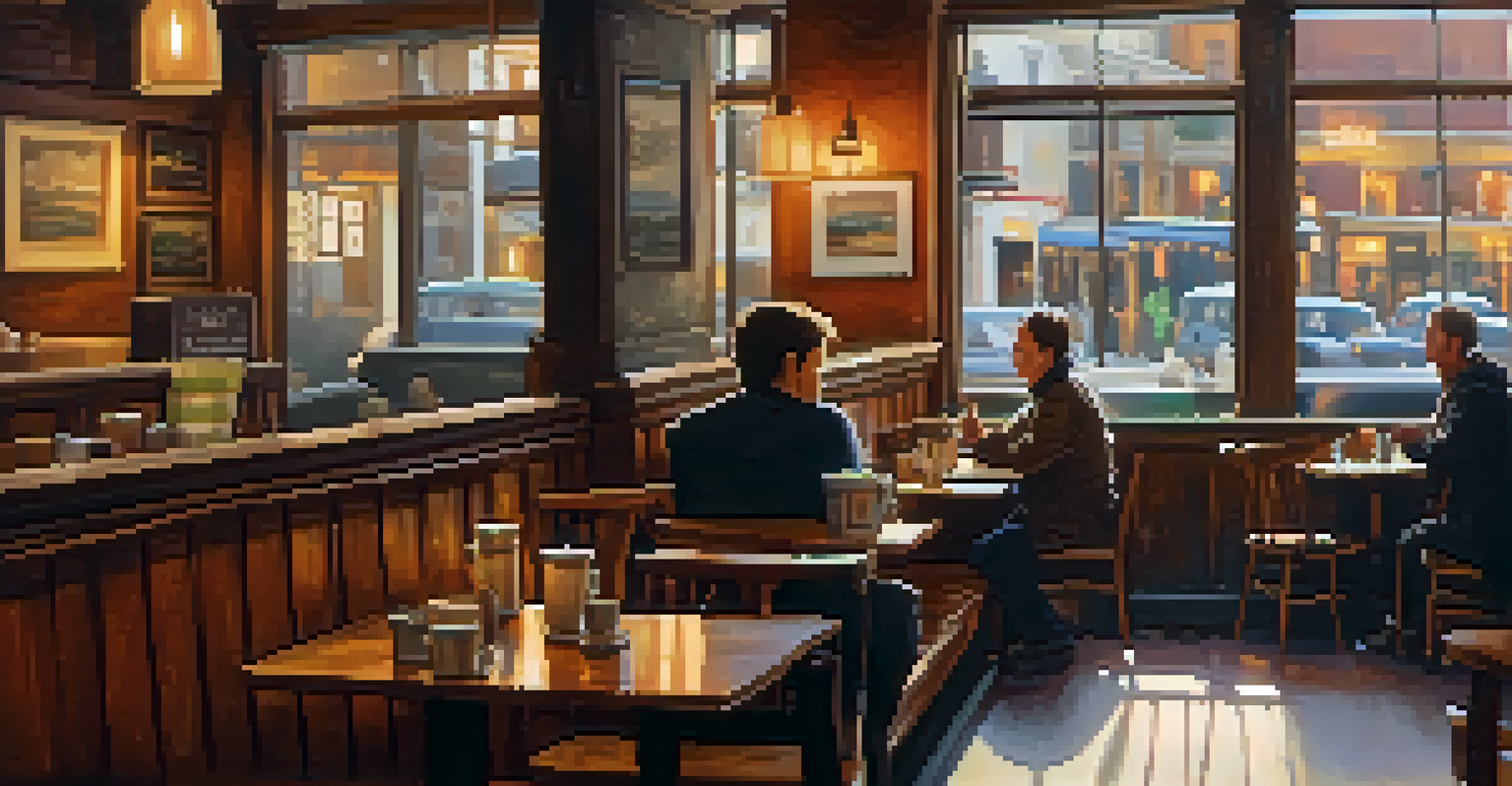Situational Awareness: Staying Alert as a Solo Traveler

Understanding Situational Awareness for Travelers
Situational awareness is the ability to perceive and understand your surroundings. For solo travelers, this skill is crucial as it helps you stay safe and navigate unfamiliar spaces with confidence. It involves being alert to both the people around you and the environment, allowing you to make informed decisions.
The best way to predict the future is to create it.
Imagine walking through a bustling market; the sights, sounds, and smells are all around you. By honing your situational awareness, you can notice unusual behavior or potential hazards, like a sudden change in the crowd's mood. This heightened awareness empowers you to take proactive measures to ensure your safety.
In essence, practicing situational awareness means remaining engaged with your environment. Whether it's noticing when something feels off or recognizing a potential escape route, these small observations can make a significant difference in your travel experience.
Trusting Your Intuition as a Solo Traveler
When traveling alone, your intuition becomes a powerful ally. It's that gut feeling that can guide you in making decisions, especially when something doesn’t seem right. If you sense danger or feel uncomfortable in a situation, it's essential to trust that instinct and take action.

For example, if a stranger approaches you with an overly friendly demeanor, take a moment to assess the situation. Are they invading your personal space or making you feel uneasy? Trusting your intuition can help you avoid potential risks and navigate your journey safely.
Enhance Safety with Awareness
Situational awareness is vital for solo travelers, enabling them to recognize potential dangers and navigate unfamiliar environments confidently.
Remember, your intuition is honed through experiences, so pay attention to those subtle cues. By recognizing and acting on your gut feelings, you can enhance your overall sense of security while exploring new destinations.
Staying Aware of Your Surroundings
Being aware of your surroundings goes beyond just looking around; it involves actively engaging with your environment. This means taking note of exits, identifying potential threats, and being conscious of the people around you. Simple practices, like scanning the area when you enter a new place, can significantly increase your safety.
Your intuition knows what to do; the challenge is getting your ego out of the way.
For instance, when you sit down at a café, take a moment to observe the layout—where are the exits, and who else is there? This awareness helps you feel more grounded and prepared for any unexpected situations. It's like playing a game of chess; you need to think a few moves ahead.
By cultivating this habit of awareness, you not only enhance your safety but also enrich your travel experience. You'll find yourself more engaged with the culture and environment, making your journey all the more rewarding.
Utilizing Technology for Enhanced Safety
In today's digital age, technology can be a fantastic tool for solo travelers. With smartphones, you can access maps, translation apps, and local emergency numbers, all at your fingertips. These resources can help you stay informed and connected, allowing for better situational awareness.
For example, using apps that provide real-time updates about local safety conditions can help you avoid areas that are experiencing trouble. Additionally, sharing your location with a trusted friend or family member can provide an extra layer of security. It’s like having a virtual safety net that you can rely on during your travels.
Trust Your Intuition
Listening to your gut feelings can help solo travelers make safer decisions and avoid uncomfortable situations.
However, while technology is beneficial, it's essential to remain vigilant and not become overly reliant on it. Always maintain a balance between using tech tools and staying present in your surroundings. This combination will enhance your travel experience while keeping you safe.
Establishing a Routine for Safety
Creating a routine while traveling can provide a sense of familiarity and enhance your safety. Establishing regular habits, such as checking in with someone at a specific time or following a consistent daily schedule, can help you remain aware and focused. This routine can act as a safety net, allowing you to notice any anomalies.
For instance, if you typically take a morning walk through a particular area, you'll quickly recognize if something feels off or if there have been changes in the environment. Having that familiarity can be your first line of defense against potential dangers.
Moreover, routines can make your travel experience more enjoyable. By incorporating local customs or traditions into your daily activities, you create a deeper connection with the place you’re exploring while maintaining a sense of security.
Connecting with Locals for Insights
Engaging with locals can provide valuable insights into your surroundings and enhance your situational awareness. Locals often have a wealth of knowledge about their area, including hidden dangers and safe spots to visit. Building connections can also make your travel experience more enriching and enjoyable.
For example, striking up a conversation with a shop owner can lead to tips on which neighborhoods to avoid at night or the best times to visit popular attractions. These personal insights can help you navigate your journey more safely and confidently.
Connect with Locals for Insights
Engaging with locals can provide valuable safety tips and enhance the overall travel experience by fostering a sense of community.
Additionally, forming these connections can foster a sense of community, making you feel less isolated as a solo traveler. Not only do you gain practical advice, but you also create memorable interactions that enhance your overall experience.
Practicing Self-Care for Better Awareness
Taking care of yourself physically and mentally is crucial for maintaining situational awareness. When you are well-rested, nourished, and mentally balanced, you are more likely to be alert and responsive to your environment. Simple self-care practices can greatly impact your ability to stay aware.
For instance, ensure you get enough sleep, stay hydrated, and take breaks when needed. If you’re feeling tired or overwhelmed, it can be easy to overlook surroundings or miss important cues. Self-care is like recharging your phone; you need to ensure your battery is full to function optimally.

Incorporating mindfulness practices, such as meditation or deep breathing, can also enhance your awareness. These techniques can help clear your mind and sharpen your focus, allowing you to be more present and engaged in your travel experience.